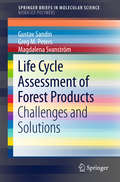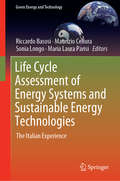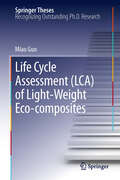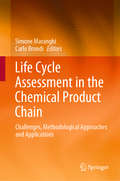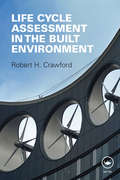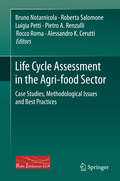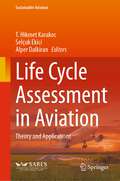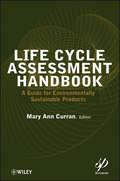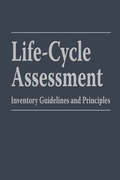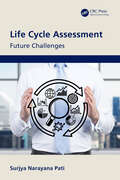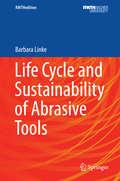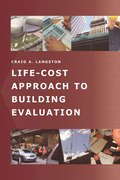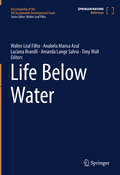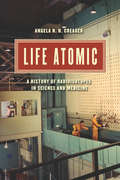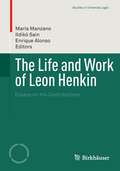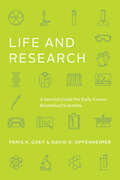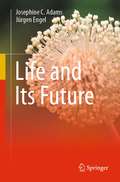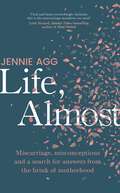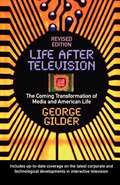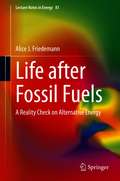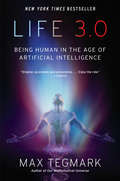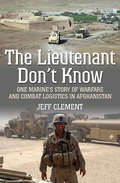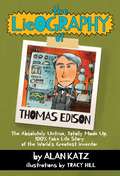- Table View
- List View
Life Cycle Assessment of Forest Products
by Gustav Sandin Greg M. Peters Magdalena SvanströmThis brief contains information on the reduction of environmental impact and explains how it is a key driver for the R&D of new forest products. The authors, experts in the field, describe how Life Cycle Assessment (LCA) is used to assess the environmental impact of such products, e. g. in order to guide R&D or attract investments. The authors describe the main challenges of carrying out LCAs on forest products, make recommendations for managing these challenges, and discuss future research needs. LCA case studies are used to illustrate the challenges, covering a variety of forest products: building components, biofuels, industrial chemicals, textile fibres and clothing. Described challenges include the planning of LCA studies (e. g. how can one use LCA in R&D?), the modelling of product systems (how can one handle multi-functionality and uncertainties related to waste handling and geographical location of future production?) and environmental impact (how can one assess water and land use impact, and the climate impact of biomass?).
Life Cycle Assessment of Energy Systems and Sustainable Energy Technologies: The Italian Experience (Green Energy and Technology)
by Riccardo Basosi Maurizio Cellura Sonia Longo Maria Laura ParisiThis book deals with the application of life cycle assessment (LCA) methodology to sustainable energy systems and technologies. It reviews the state-of-the-art of the Italian experiences on the LCA applied to energy, and the most recent results from research in this field, with a particular focus on renewables, bio-energy and sustainable solutions. The contributors describe in detail the applications of LCA to various energy system topics, including: • electricity production, smart energy grids and energy storage systems;• renewable energy production from biomass;• production of biodiesel from microalgae;• environmental impacts of biomass power plants; and• geothermal energy production. These topics are supported by critical reviews and case studies, with discussions of Italian examples, demonstrating LCA’s application to various energy systems. A particular focus is placed on bio-energies and bio-energy systems, demonstrating how LCA can be used for optimal bio-energy production. This book offers an opportunity for researchers and advanced practitioners in the field of LCA to learn more about the application of LCA methodology to energy systems and technologies. It will also be of interest to students, as it enables them to understand the environmental impacts of energy systems and sustainable energy technologies, through the analysis of their life cycles.
Life Cycle Assessment (LCA) of Light-Weight Eco-composites
by Miao GuoMiao Guo's PhD thesis provides scientific insights into the environmental issues related to biocomposites based on starch-polyvinyl alcohol (PVOH) blends. The author contributes significantly to the methodological issues underlying the Life Cycle Assessment (LCA) modelling approach. As well as presenting complete LCA inventories using primary data from a variety of sources, Guo develops a new modelling approach incorporating the process-oriented biogeochemistry model Denitrification-Decomposition (DNDC) into site-specific LCA studies to simulate carbon and nitrogen dynamics in the wheat agro-ecosystem. This thesis addresses important LCA data quality issues by using comprehensive sensitivity and uncertainty analyses and has resulted in a large number of publications in internationally renowned journals.
Life Cycle Assessment in the Chemical Product Chain: Challenges, Methodological Approaches and Applications
by Simone Maranghi Carlo BrondiThis book outlines the methodologies, approaches and tools for modelling chemicals in a Life Cycle Assessment (LCA) perspective, and also covers the main advantages and drawbacks of applying LCA to chemical processes. In the first part of this book, authors pay close attention to the limitations of modelling the environmental and social impacts of chemical processes, providing valuable insights to the problems of the Life Cycle Inventory (LCI) analysis for chemical processes. In the second part of this book, readers will learn about the LCA application to chemical processes in the laboratory and industrial scale. In each chapter of this book, readers will also find specific case studies on the modelling and application of LCA in the chemical industry.
Life Cycle Assessment in the Built Environment
by Robert CrawfordLife cycle assessment enables the identification of a broad range of potential environmental impacts occurring across the entire life of a product, from its design through to its eventual disposal or reuse. The need for life cycle assessment to inform environmental design within the built environment is critical, due to the complex range of materials and processes required to construct and manage our buildings and infrastructure systems. After outlining the framework for life cycle assessment, this book uses a range of case studies to demonstrate the innovative input-output-based hybrid approach for compiling a life cycle inventory. This approach enables a comprehensive analysis of a broad range of resource requirements and environmental outputs so that the potential environmental impacts of a building or infrastructure system can be ascertained. These case studies cover a range of elements that are part of the built environment, including a residential building, a commercial office building and a wind turbine, as well as individual building components such as a residential-scale photovoltaic system. Comprehensively introducing and demonstrating the uses and benefits of life cycle assessment for built environment projects, this book will show you how to assess the environmental performance of your clients’ projects, to compare design options across their entire life and to identify opportunities for improving environmental performance.
Life Cycle Assessment in the Agri-food Sector
by Bruno Notarnicola Roberta Salomone Luigia Petti Pietro A. Renzulli Rocco Roma Alessandro K. CeruttiThe book presents an overview of the International practices and state-of-the-art of LCA studies in the agri-food sector, both in terms of adopted methodologies and application to particular products; the final purpose is to characterise and put order within the methodological issues connected to some important agri-food products (wine, olive oil, cereals and derived products, meat and fruit) and also defining practical guidelines for the implementation of LCAs in this particular sector. The first chapter entails an overview of the application of LCA to the food sector, the role of the different actors of the food supply chain and the methodological issues at a general level. The other chapters, each with a particular reference to the main foods of the five sectors under study, have a common structure which entails the review of LCA case studies of such agri-food products, the methodological issues, the ways with which they have been faced and the suggestion of practical guidelines.
Life Cycle Assessment in Aviation: Theory and Applications (Sustainable Aviation)
by T. Hikmet Karakoc Selçuk Ekici Alper DalkiranLife Cycle Assessment in Aviation: Theory and Applications provides readers with a comprehensive analysis that examines various elements within the aviation sector, including aircraft operations, maintenance and repair activities, aircraft gas turbine engine processes, airport auxiliary vehicles, airport operations, airport construction, airport access traffic, and airport wastes. The book’s content has been meticulously crafted to address the specific needs and interests of a diverse audience encompassing researchers, engineering students, and civil aviation organization officials. Readers will find valuable insights and up-to-date information about the latest developments in the aviation field, serving as a valuable resource for their investigations and studies.
Life Cycle Assessment Handbook
by Mary Ann CurranThe first book of its kind, the LCA Handbook will become an invaluable resource for environmentally progressive manufacturers and suppliers, product and process designers, executives and managers, and government officials who want to learn about this essential component of environmental sustainability.
Life-Cycle Assessment: Inventory Guidelines and Principles
by Battelle Memorial Institute Mary Ann CurranLife-Cycle Assessment presents a brief overview of the development of the life-cycle assessment process and develops guidelines and principles for implementation of a product life-cycle inventory analysis. The book describes inventory analysis, impact analysis, and improvement analysis-the three components of a product life-cycle assessment. It discusses the major stages in a life cycle, including raw materials acquisition, materials manufacture, final product fabrication, filling/packaging/distribution, and consumer use and disposal.
Life Cycle Assessment: Future Challenges
by Surjya Narayana PatiThis book offers an itemized analysis of Life Cycle Assessment (LCA), for use in any processes, products, services, industries, organizations and so forth. Various challenges faced during applications of LCA, and its extension are discussed including their benefits. Further, the book provides practical examples of LCA in different core sectors, such as cement and construction. Each chapter functions as a stand-alone unit within the book and defines its individual role within the overall concept of LCA. Features: Covers Life Cycle Assessment (LCA) and future challenges including its practical applications as climate change tool. Connects life cycle management and LCA/environmental management. Explains benefits of LCA studies for both internal and external purpose in terms of various impact parameters. Identifies different raw materials or alternate energy mediums for changing inputs to reduce environmental impacts. Discusses extension of LCA concept like LCC, LCSA, SCLA, and OLCA. This book is aimed at professionals in all engineering areas and environmental studies.
Life Cycle and Sustainability of Abrasive Tools
by Barbara LinkeThis monograph focuses on abrasive tools for grinding, polishing, honing, and lapping operations. The book describes the life cycle of abrasive tools from raw material processing of abrasive grits and bonding, manufacturing of monolithic or multi-layered tools, tool use to tool end-of-life. Moreover, this work highlights sustainability challenges including economic, environmental, social and technological aspects. The target audience primarily comprises research and industry experts in the field of manufacturing, but the book may also be beneficial for graduate students.
Life-Cost Approach to Building Evaluation
by Craig LangstonLife-cost approach to building evaluation comprehensively addresses in a reader-friendly, accessible way the fundamentals of life-cost studies in the built environment. It includes the time-value of money, discounted cash-flow analysis, differential price-level movement and affordability fluctuations. Contemporary issues such as occupancy costs, sustainability implications and value adding are also addressed. Replete with illustrations and examples, this innovative book provides a holistic approach to evaluation that integrates life-costing to broader social and environmental criteria.Important features include:- presentation materials to facilitate face-to-face and online learning - review questions- worked tutorial exercises, and- example examination papers.
Life Below Water (Encyclopedia of the UN Sustainable Development Goals)
by Walter Leal Filho Anabela Marisa Azul Luciana Brandli Amanda Lange Salvia Tony WallThe problems related to the process of industrialisation such as biodiversity depletion, climate change and a worsening of health and living conditions, especially but not only in developing countries, intensify. Therefore, there is an increasing need to search for integrated solutions to make development more sustainable. The United Nations has acknowledged the problem and approved the “2030 Agenda for Sustainable Development”. On 1st January 2016, the 17 Sustainable Development Goals (SDGs) of the Agenda officially came into force. These goals cover the three dimensions of sustainable development: economic growth, social inclusion and environmental protection. The Encyclopedia of the UN Sustainable Development Goals comprehensively addresses the SDGs in an integrated way. It encompasses 17 volumes, each one devoted to one of the 17 SDGs. This volume is dedicated to SDG 14 “Conserve and sustainably use the oceans, seas and marine resources for sustainable development". Marine and coastal bio-resources, play an essential role in human well-being and social and economic development. This volume addresses this sustainability challenge providing the description of a range of terms, which allows a better understanding and fosters knowledge about it.Concretely, the defined targets are:Prevent and significantly reduce marine pollution of all kinds, in particular from land-based activities, including marine debris and nutrient pollutionSustainably manage and protect marine and coastal ecosystems to avoid significant adverse impacts, including by strengthening their resilience, and take action for their restoration in order to achieve healthy and productive oceansMinimize and address the impacts of ocean acidification, including through enhanced scientific cooperation at all levelsEffectively regulate harvesting and end overfishing, illegal, unreported and unregulated fishing and destructive fishing practices and implement science-based management plans, in order to restore fish stocks in the shortest time feasible, at least to levels that can produce maximum sustainable yield as determined by their biological characteristicsConserve at least 10 per cent of coastal and marine areas, consistent with national and international law and based on the best available scientific informationProhibit certain forms of fisheries subsidies which contribute to overcapacity and overfishing, eliminate subsidies that contribute to illegal, unreported and unregulated fishing and refrain from introducing new such subsidies, recognizing that appropriate and effective special and differential treatment for developing and least developed countries should be an integral part of the World Trade Organization fisheries subsidies negotiation 16Increase the economic benefits to small island developing states and least developed countries from the sustainable use of marine resources, including through sustainable management of fisheries, aquaculture and tourism Increase scientific knowledge, develop research capacity and transfer marine technology, taking into account the Intergovernmental Oceanographic Commission Criteria and Guidelines on the Transfer of Marine Technology, in order to improve ocean health and to enhance the contribution of marine biodiversity to the development of developing countries, in particular small island developing states and least developed countriesProvide access for small-scale artisanal fishers to marine resources and marketsEnhance the conservation and sustainable use of oceans and their resources by implementing international law as reflected in the United Nations Convention on the Law of the Sea, which provides the legal framework for the conservation and sustainable use of oceans and their resources, as recalled in paragraph 158 of “The future we want”Editorial Board</di
Life Atomic: A History of Radioisotopes in Science and Medicine (Synthesis Ser.)
by Angela N. CreagerAfter World War II, the US Atomic Energy Commission (AEC) began mass-producing radioisotopes, sending out nearly 64,000 shipments of radioactive materials to scientists and physicians by 1955. Even as the atomic bomb became the focus of Cold War anxiety, radioisotopes represented the government’s efforts to harness the power of the atom for peace—advancing medicine, domestic energy, and foreign relations. In Life Atomic, Angela N. H. Creager tells the story of how these radioisotopes, which were simultaneously scientific tools and political icons, transformed biomedicine and ecology. Government-produced radioisotopes provided physicians with new tools for diagnosis and therapy, specifically cancer therapy, and enabled biologists to trace molecular transformations. Yet the government’s attempt to present radioisotopes as marvelous dividends of the atomic age was undercut in the 1950s by the fallout debates, as scientists and citizens recognized the hazards of low-level radiation. Creager reveals that growing consciousness of the danger of radioactivity did not reduce the demand for radioisotopes at hospitals and laboratories, but it did change their popular representation from a therapeutic agent to an environmental poison. She then demonstrates how, by the late twentieth century, public fear of radioactivity overshadowed any appreciation of the positive consequences of the AEC’s provision of radioisotopes for research and medicine.
The Life and Work of Leon Henkin
by María Manzano Ildikó Sain Enrique AlonsoThis is a comprehensive book on the life and works of Leon Henkin (1921-2006), an extraordinary scientist and excellent teacher whose writings became influential right from the beginning of his career with his doctoral thesis on "The completeness of formal systems" under the direction of Alonzo Church. Upon the invitation of Alfred Tarski, Henkin joined the Group in Logic and the Methodology of Science in the Department of Mathematics at the University of California Berkeley in 1953. He stayed with the group until his retirement in 1991. This edited volume includes both foundational material and a logic perspective. Algebraic logic, model theory, type theory, completeness theorems, philosophical and foundational studies are among the topics covered, as well as mathematical education. The work discusses Henkin's intellectual development, his relation to his predecessors and contemporaries and his impact on the recent development of mathematical logic. It offers a valuable reference work for researchers and students in the fields of philosophy, mathematics and computer science.
Life and Research: A Survival Guide for Early-Career Biomedical Scientists (Chicago Guides to Academic Life)
by Paris H. Grey David G. OppenheimerLife in a research lab can be daunting, especially for early-career scientists. Personal and professional hurdles abound in bench research, and this book by two seasoned lab professionals is here to help graduate students, postdocs, and staff scientists recognize stumbling blocks and avoid common pitfalls. Building and maintaining a mentoring network, practicing self-care and having a life outside of the lab, understanding that what works perfectly for a labmate might not work for you—these are just a few of the strategies that lab manager and molecular biologist Paris H. Grey and PI and geneticist David G. Oppenheimer wished they had implemented far sooner in their careers. They also offer practical advice on managing research projects, sharing your work on social media, and attending conferences. Above all, they coach early-career scientists to avoid burnout and make the most of every lab experience to grow and learn.
Life and Research: A Survival Guide for Early-Career Biomedical Scientists (Chicago Guides to Academic Life)
by Paris H. Grey David G. OppenheimerLife in a research lab can be daunting, especially for early-career scientists. Personal and professional hurdles abound in bench research, and this book by two seasoned lab professionals is here to help graduate students, postdocs, and staff scientists recognize stumbling blocks and avoid common pitfalls. Building and maintaining a mentoring network, practicing self-care and having a life outside of the lab, understanding that what works perfectly for a labmate might not work for you—these are just a few of the strategies that lab manager and molecular biologist Paris H. Grey and PI and geneticist David G. Oppenheimer wished they had implemented far sooner in their careers. They also offer practical advice on managing research projects, sharing your work on social media, and attending conferences. Above all, they coach early-career scientists to avoid burnout and make the most of every lab experience to grow and learn.
Life and Research: A Survival Guide for Early-Career Biomedical Scientists (Chicago Guides to Academic Life)
by Paris H. Grey David G. OppenheimerLife in a research lab can be daunting, especially for early-career scientists. Personal and professional hurdles abound in bench research, and this book by two seasoned lab professionals is here to help graduate students, postdocs, and staff scientists recognize stumbling blocks and avoid common pitfalls. Building and maintaining a mentoring network, practicing self-care and having a life outside of the lab, understanding that what works perfectly for a labmate might not work for you—these are just a few of the strategies that lab manager and molecular biologist Paris H. Grey and PI and geneticist David G. Oppenheimer wished they had implemented far sooner in their careers. They also offer practical advice on managing research projects, sharing your work on social media, and attending conferences. Above all, they coach early-career scientists to avoid burnout and make the most of every lab experience to grow and learn.
Life and Its Future
by Josephine C. Adams Jürgen EngelThis book is aimed at those who wish to understand more about the molecular basis of life and how life on earth may change in coming centuries. Readers of this book will gain knowledge of how life began on Earth, the natural processes that have led to the great diversity of biological organisms that exist today, recent research into the possibility of life on other planets, and how the future of life on earth faces unprecedented pressures from human-made activities. Readers will obtain a perspective on the potential risks of chemical or nuclear warfare, and the ever-increasing risks from human activities that are causing pollution and climate change with global heating. Readers will also learn about ongoing research efforts to generate “designer lifeforms” through synthetic biology and applications of artificial intelligence. The book makes an integrated, up-to-date, overview of topics often considered as separate fields. It should be valuable to students, teachers, and people who are concerned about the future of life.
Life, Almost: Miscarriage, misconceptions and a search for answers from the brink of motherhood
by Jennie Agg'Vital and heart-wrenchingly intimate' Leah Hazard'Urgent, fascinating and thought-provoking' Julia Bueno'Thoughtfully researched and beautifully written' Pippa VosperAfter losing four pregnancies with no obvious cause, Jennie Agg set out to understand why miscarriage remains such a profoundly misunderstood, under-researched and under-acknowledged experience.Part-memoir, part-scientific investigation, Life, Almost documents Agg's path to motherhood and her search for answers. Tracing each tentative step of her fifth pregnancy - as her body becomes a creature she does not wish to spook - Agg dismantles the myths that we unquestioningly accept about our reproductive lives:· Why are we told miscarriage can't be prevented when half of all miscarriages are of perfectly healthy embryos?· Why is it normal not to tell anyone you're pregnant for the first three months? · Why don't we know why labour starts? Drawing on pioneering research and interviews with world-leading experts, Life, Almost is a ground-breaking book that will change how you think about miscarriage, and a moving reflection on grief and love at the edge of life as we understand it.
Life After Television
by George GilderPredicts that personal computers linked into a global network will soon replace television, and thereby overthrow the tyranny of mass media, renew individual power, and promote democracy worldwide. Urges American business to get on the ball with fiber optics. Reprinted from the 1990 edition published by Whittle Books. No index or bibliography.
Life after Fossil Fuels: A Reality Check on Alternative Energy (Lecture Notes in Energy #81)
by Alice J. FriedemannThis book is a reality check of where energy will come from in the future. Today, our economy is utterly dependent on fossil fuels. They are essential to transportation, manufacturing, farming, electricity, and to make fertilizers, cement, steel, roads, cars, and half a million other products. One day, sooner or later, fossil fuels will no longer be abundant and affordable. Inevitably, one day, global oil production will decline. That time may be nearer than we realize. Some experts predict oil shortages as soon as 2022 to 2030. What then are our options for replacing the fossil fuels that turn the great wheel of civilization?Surveying the arsenal of alternatives – wind, solar, hydrogen, geothermal, nuclear, batteries, catenary systems, fusion, methane hydrates, power2gas, wave, tidal power and biomass – this book examines whether they can replace or supplement fossil fuels. The book also looks at substitute energy sources from the standpoint of the energy users. Manufacturing, which uses half of fossil fuels, often requires very high heat, which in many cases electricity can't provide. Industry uses fossil fuels as a feedstock for countless products, and must find substitutes. And, as detailed in the author's previous book, "When Trucks Stop Running: Energy and the Future of Transportation," ships, locomotives, and heavy-duty trucks are fueled by diesel. What can replace diesel?Taking off the rose-colored glasses, author Alice Friedemann analyzes our options. What alternatives should we deploy right now? Which technologies merit further research and development? Which are mere wishful thinking that, upon careful scrutiny, dematerialize before our eyes? Fossil fuels have allowed billions of us to live like kings. Fueled by oil, coal, and natural gas, we changed the equation constraining the carrying capacity of our planet. As fossil fuels peak and then decline, will we fall back to Earth? Are there viable alternatives?
Life 3.0: Being Human in the Age of Artificial Intelligence
by Max TegmarkNew York Times Best SellerHow will Artificial Intelligence affect crime, war, justice, jobs, society and our very sense of being human? The rise of AI has the potential to transform our future more than any other technology—and there&’s nobody better qualified or situated to explore that future than Max Tegmark, an MIT professor who&’s helped mainstream research on how to keep AI beneficial. How can we grow our prosperity through automation without leaving people lacking income or purpose? What career advice should we give today&’s kids? How can we make future AI systems more robust, so that they do what we want without crashing, malfunctioning or getting hacked? Should we fear an arms race in lethal autonomous weapons? Will machines eventually outsmart us at all tasks, replacing humans on the job market and perhaps altogether? Will AI help life flourish like never before or give us more power than we can handle? What sort of future do you want? This book empowers you to join what may be the most important conversation of our time. It doesn&’t shy away from the full range of viewpoints or from the most controversial issues—from superintelligence to meaning, consciousness and the ultimate physical limits on life in the cosmos.
The Lieutenant Don't Know: One Marine's Story of Warfare and Combat Logistics in Afghanistan
by Jeffrey Clement“A unique insight into the war experience . . . a realistic picture of what it is like to serve in Afghanistan as a Marine combat logistician” (Small Wars Journal).When he joined the Marines, Jeff Clement was not a high-speed, top-secret recon guy. A logistician instead, he led combat convoys across treacherous terrain in southern Afghanistan through frequent enemy attacks in order to resupply US and British positions. As such, he and his vehicles were a constant target for the resistance, and each movement was a travail, often accompanied by thundering blasts as the insurgents paved their way with IEDs. Every step forward was fraught with danger, even as each objective had to be met. As a Marine Corps lieutenant, he deployed to Afghanistan twice and always found a learning curve, as men previously on the ground were more savvy, and the insurgents, there for the duration, were savvier still.The Lieutenant Don’t Know provides a refreshing look at the nitty-gritty of what our troops have been dealing with in Afghanistan—from the perspective of a young officer who was perfectly willing to learn and take responsibility for his units in a confusing war where combat was not merely on the “front,” but all around and looking over all their roads.“Finally, a readable, honest and gritty account of the dangerous, exhausting labor that keeps ‘The Green Machine’ going.” —Bing West, New York Times–bestselling author of One Million Steps“One of the best war memoirs I’ve ever read . . . a moving, inspiring work, that’s enjoyable as hell, as well.” —Stan R. Mitchell, author of Gravel Road
The Lieography of Thomas Edison: The Absolutely Untrue, Totally Made Up, 100% Fake Life Story of the World's Greatest Inventor (Lieographies Ser. #1)
by Alan KatzThomas Edison, world-class inventor. You might know that he devised the electric light bulb and the phonograph. But what about his development of train-controlling sticks? Or his airborne way to send pancakes to his Cousin Fran in Texas? You&’re about to be treated to the Lieographical aspects of Thomas Edison&’s life, in this funny, lighthearted, &“all that didn&’t happen&” take on the man whose inventions transformed our daily existence. The book ends with a short—but true—account of Edison&’s life—just enough to encourage kids to find out more on this important historical figure. But even if readers have already learned about Edison, the wacky stories in this tall-tales book will be even more enjoyable.
